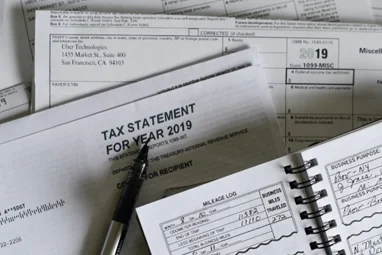
What is a tax return?
A tax return is a form that individuals or businesses use to report their income and tax liability to the government. This information is used to determine how much taxes a person or company owes or is entitled to a refund. The tax filing process is an important aspect of complying with tax laws and regulations.
A tax return usually includes information such as the name of the individual or company, social security number or taxpayer identification number, income, deductions, and other relevant information such as the number of dependents. The information provided on a tax return is used by the government to calculate the amount of taxes due or the amount of a refund.
Individuals are required to file a taxes return each year if their income exceeds a certain amount, which varies depending on filing status and other factors. The deadline for filing a taxes return is usually April 15 of each year, but in some cases, it can be extended. Filing a tax return is important because failure to do so can result in fines and sanctions, and may also make it difficult to get certain benefits, such as a mortgage or loan.
In addition to individuals, businesses must also file tax returns. Tax returns include information about the company’s income, expenses, and tax liabilities. Businesses may also be required to make estimated tax payments throughout the year to avoid penalties for underpayments.
There are several types of tax returns, including an individual taxes return, a business tax return, and probate and trust tax return. Each type of tax return requires different information and has different rules and regulations.
1. Form 1040
An individual taxes return, also known as Form 1040, is the most common type of tax return and is used by individuals to report their income, deductions, and tax liability. This form is used to calculate the amount of taxes due or the amount of the refund. An individual taxes return includes information such as the individual’s income from employment, investments, and other sources, as well as any deductions or credits to which the individual is entitled.
2. Form 1120
The tax return, also known as Form 1120, is used by companies to report their income, expenses, and tax liabilities. This form includes information about the company’s income, expenses, and other relevant information. Business tax returns are used to calculate the amount of taxes due or refunds for a company.
3. Form 1041
The Estate and Trust Tax Return, also known as Form 1041, is used to report income, deductions, and tax liabilities from an estate or trust. This form includes information about income received by the estate or trust, as well as any expenses incurred. The inheritance and trust tax return is used to calculate the amount of taxes due or the amount of reimbursement for an estate or trust.
A tax return is an important document used to report to the government the income, deductions, and tax liabilities of an individual or business. The information provided on the tax return is used to calculate the amount of taxes due or the amount of the refund. Filing a tax return is a legal requirement for individuals and businesses, and failure to comply with this requirement may result in sanctions and fines.
Lines for filing a tax return

The requirement to file a tax return depends on various factors such as your income, filing status, and other circumstances. Generally, individuals are required to file a tax return if their income exceeds a certain amount, which is determined by the Internal Revenue Service (IRS).
Individuals who are US citizens or residents are required to file a tax return if their gross income for the year exceeds the standard deduction plus personal exemption. Standard deductions and personal exemptions are adjusted annually for inflation. In the tax year 2022, the standard deduction for an individual is $12,550 and the personal exemption is $0.
In addition to the standard deduction and personal exemption, other factors that may affect the requirement to file a tax return include having dependents, self-employment income, and receiving certain types of income such as capital gains, rental income, and unemployment benefits.
Individuals who are self-employed or have business income must file a taxes return if their net self-employment or business income is $400 or more. In addition, individuals who received unemployment benefits during the year are required to report this income on their tax returns.
Individuals who are not required to file a taxes return may do so if they qualify for certain tax credits or benefits, such as an earned income tax credit, or if they qualify for a refund of taxes withheld from their paycheck.
Businesses are also required to file a taxes return, regardless of their size or the amount of income they generate. Businesses use tax returns to report their income, expenses, and tax liabilities to the government. The type of tax return a business must file depends on the type of legal entity, such as a sole proprietorship, partnership, corporation, or limited liability company.
As a rule, the deadline for filing a taxes return is April 15 of each year. However, the period may be extended in some cases, such as for those serving in a war zone or those who live outside the United States.
The requirement to file a taxes return depends on various factors such as your income, filing status, and other circumstances. Individuals are generally required to file a taxes return if their income exceeds a certain amount, and businesses are required to file a tax return regardless of their size or the amount of income they generate. It is important to consult with a tax professional or the IRS for more information on when you need to file a tax return.
Difficulties in filing a tax return

Filing a taxes return can be a complex and difficult process, especially for individuals who have multiple sources of income, are self-employed, or have a large number of deductions. While many people find this process relatively easy, others face various difficulties that can arise when filing a taxes return. Some of the more common difficulties include the following:
1. Understanding tax laws and regulations.
The tax code is complex and constantly changing, making it difficult for individuals to keep track of the latest changes and understand the implications of their tax returns. In addition, many people are unaware of the various deductions and credits that can greatly reduce their tax liability.
2. Tracking income and expenses.
Accurate reporting of all sources of income and expenses can be challenging, especially for individuals who are self-employed or have multiple sources of income. It is important to keep accurate records throughout the year, including receipts, invoices, and bank statements, to ensure that all sources of income and expenses are recorded on your taxes return.
3. Requiring deductions and credits.
Claiming deductions and credits can be tricky, especially for those unfamiliar with the tax code. For example, individuals may not be aware of deduction requirements such as charitable contributions, medical expenses, and home office expenses.
4. Navigation in tax software.
Many people choose to file their tax returns using tax software, which can be a convenient and efficient way to complete the process. However, navigating through the software can be difficult for those who are not familiar with computers or have limited experience with tax preparation software.
5. Filing electronically.
While the electronic filing of tax returns is becoming more popular, some people are hesitant to file their tax returns electronically due to security concerns. In addition, some people may not have access to a computer or the Internet, making it difficult to file a taxes return electronically.
6. Avoid errors.
Filing a tax return can be time-consuming and complex, which increases the risk of errors. Common mistakes include incorrect information, such as the wrong social security number or incorrect income amounts, and forgetting to sign the declaration. These errors can result in significant delays in processing the return and possibly penalties or sanctions from the IRS.
In conclusion, filing a taxes return can be a difficult process, but with proper planning and preparation, many of these difficulties can be avoided. Individuals are advised to study the tax code, keep accurate records throughout the year, and seek help from a tax professional if they are unsure how to proceed. By taking these steps, individuals can ensure that their tax return is accurate and timely, avoiding the stress and hassle that often accompanies the taxes return preparation process.
Read more about Vehicle Taxation


